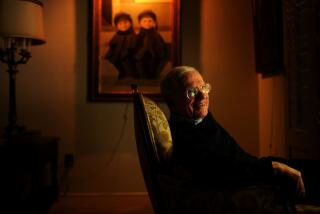Lazare Bernhard, 96; Won Heroism Medal for Saving Man Caught in ’27 Rip Current
- Share via
Lazare F. Bernhard, who was awarded a Carnegie Medal more than 75 years ago after he rescued a drowning man from a strong riptide in Santa Monica Bay, has died. He was 96.
Bernhard died Sunday of natural causes at his longtime home in Pacific Palisades, his family said.
He was an 18-year-old sophomore at Stanford University visiting his family in 1927 when he responded to a woman on the beach who screamed that her son was drowning.
One man had already tried to rescue 30-year-old Carl Blake but had turned back because of heavy surf.
A strong swimmer with lifeguard training, Bernhard dived in, fought the current and Blake’s panic, and struggled to swim them both to safety. On shore, he administered artificial resuscitation. The pair never saw each other or communicated again.
Two years later, Bernhard received the medal and $1,500 from the Carnegie Hero Fund. Blake’s mother had secretly nominated him for the award.
Andrew Carnegie established the fund in 1904 to recognize “civilization’s heroes.” More than 8,900 medals have been awarded to people who have risked their lives while trying to save someone else’s.
“My dad was kind of a modest man. He was proud of the medal, but he didn’t wear it like a badge of honor,” said daughter Laurie Jo Bernhard. “He said what he did was instinctive.”
The unexpected money -- and his job delivering laundry -- paid Bernhard’s way through Stanford Law School, which cost $98 a quarter in the early 1930s, said Lanie Bernhard, his wife of 56 years.
About 54 years after the near-drowning, Blake’s son wrote Bernhard to thank him for saving his father’s life. His letter began, “If you wouldn’t have been there, I wouldn’t be here.” Carl Blake had lived 50 more years after the rescue.
Lazare Fred Bernhard was born Aug. 12, 1908, in Fort Worth to German immigrants.
His father ran a women’s clothing store where the young Bernhard worked Saturdays and earned $1 a week.
One of the earliest photos of Bernhard shows him touring Yellowstone National Park in a covered wagon with his family.
In 1922, the family moved to Los Angeles. Bernhard, who graduated from high school at 16, earned his bachelor’s degree in 1929 from Stanford and his law degree in 1932. As a young man, he often played polo with Will Rogers at the star’s Pacific Palisades estate, his daughter said.
Bernard practiced law in Los Angeles before becoming a lawyer for the Army in 1942.
During World War II, he was flown to England on several clandestine missions, including delivery of D-day orders to the military.
“He said many people got encoded messages that they had to memorize and deliver. And whether his was actually part of the D-day message or part of the decoy, he never knew,” his daughter said.
After the war, he resumed practicing law.
As Bernhard became more successful, he wanted to give something back. He asked the Carnegie fund if he could make a donation, because the organization’s generosity had helped him so much.
“They said, ‘No one has ever offered to give us money before,’ ” his wife recalled. “They didn’t know if they were allowed to accept contributions.”
In the end, the fund would accept only what Carnegie had given him, “not a penny more or a penny less,” she said.
Bernhard repaid the $1,500 and was inspired to set up a scholarship at Stanford to help students pay for law school.
In addition to his wife and daughter, Bernhard is survived by two sons, John and Paul; three grandchildren; and a sister.
Memorial contributions can be sent to the Lazare F. Bernhard Financial Aid Fund, Stanford Law School, Office of External Affairs, 559 Nathan Abbott Way, Stanford, CA 94305.
More to Read
Sign up for Essential California
The most important California stories and recommendations in your inbox every morning.
You may occasionally receive promotional content from the Los Angeles Times.














